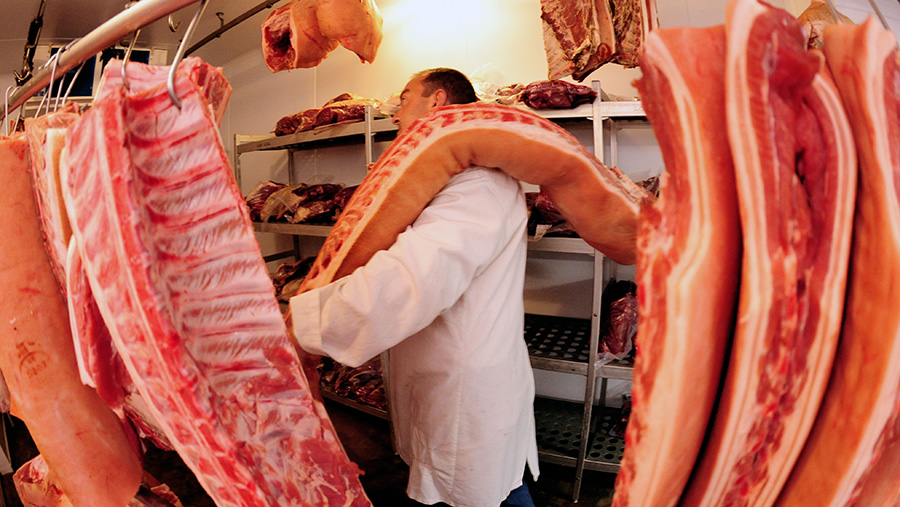Pig farmers can lock-in prices amid Brexit uncertainty
 Rex/Shutterstock
Rex/Shutterstock British pig producers must plan carefully amid post-Brexit uncertainty, advisers have warned.
The weakening pound, which has fallen about 10% against the euro, will support pig prices but make feed more expensive.
The standard pigs price recorded its biggest ever week-on-week rise in the seven days to 9 July, up 2.8p/kg to 126.57p/kg.
This was the 14th increase running, linked to tightening pig supplies, though currency was also a strong driver.
But the flipside is higher on-farm costs, as imported products like soya become more expensive. The price of soya meal leapt more than £30/t in the fortnight after the 23 June vote.
Forward buy feed
Independent consultant Peter Crichton said farmers could take the chance to fix prices for their inputs and outputs.
“There might be some logic in forward-buying feed on a more proactive basis than previously,” Mr Crichton said.
See also: Brexit market impact and outlook for farming sectors
“The weakening pound has assisted pig prices across the UK which may allow producers the opportunities to negotiate better deals with abattoirs.
“Some abattoirs are prepared to talk about fixed price contracts. It gives producers a level of security.”
Opportunities at home?
The weaker pound also pulls up the price of imported pigmeat, while also adding value to British exports, Mr Crichton added. The only risk is further turmoil in the EU knocking the euro and reversing the situation.
He said that, post-Brexit, the UK industry could focus on producing premium pork and reminding shoppers of the extra cost of high-welfare farming.
See also: Financial advice on budgets and contracts prior to Brexit
Many pig units also have seasonal or full-time migrant workers, Mr Crichton said. While their status will not be affected for the next few years at least, the industry will need those stock skills in the future.
Currently about 60% of the pork Britons eat comes from outside the country, but those imports have already become more expensive.
On the day of the vote, the average EU pig price worked out to 116p/kg. But at the lower £1:€1.2 rate, that price jumped to 125p/kg.
Exports to China could help
British pig exports are one of UK farming’s current success stories.
In the first four months of the year, pigmeat shipments were up 18% on 2015 levels at 71,350t and pork offal shipments surged 101% to 26,800t.
Last year, 32% of British production was shipped overseas, with the EU buying 70%. But the sterling’s drop against the dollar will help the further afield business grow further.
Sales to China are booming, with British pork exports to the People’s Republic doubling in 2015 and forecast for the same this year.
Karen Morgan, UK agriculture and food counsellor in Beijing, told AHDB’s export conference last month that meat demand in China was still strong, despite warnings of a slowing economy.
She said President Xi Jinping’s visit to the UK last year, along with the British government’s hailing of a golden era of Sino-British relations, had transformed the tone of negotiations over more trade.
“Demand is still strong [in China]. I don’t see that changing in the next five or six years and in the longer-term as well.”
